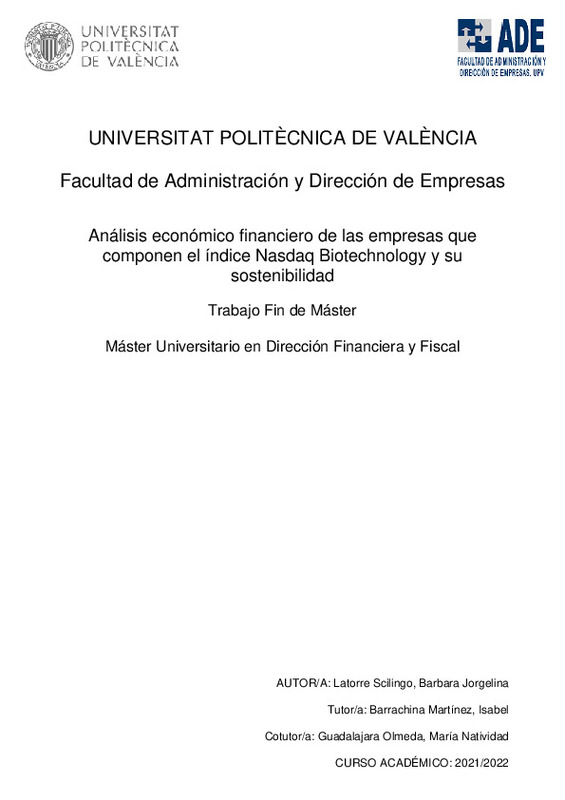|
Resumen:
|
[ES] El Nasdaq Biotechnology es un índice bursátil formado por 373 empresas en el año 2022.
Su evolución ha sido creciente desde su creación en el año 1993, y, actualmente, un alto
porcentaje de estas empresas están ...[+]
[ES] El Nasdaq Biotechnology es un índice bursátil formado por 373 empresas en el año 2022.
Su evolución ha sido creciente desde su creación en el año 1993, y, actualmente, un alto
porcentaje de estas empresas están calificadas de acuerdo con el nivel de Riesgo de ESG
de Sustainalitycs. Cuanto menor es la puntuación obtenida en este índice, mejor es la
calificación en cuanto a la sostenibilidad.
El presente Trabajo Fin de Máster tiene como objetivo el análisis de las empresas que
conforman el Nasdaq Biotechnology, los sectores que incluye, los factores que más
diferencian a estas empresas y la relación del índice ESG con los indicadores económicosfinancieros. Además, se evalúa el impacto de la pandemia del Covid-19 a través del
desempeño de carteras formados por títulos en función a su sostenibilidad.
La fuente de información para crear la base de datos para los años 2017 a 2021 ha sido
del portal Investing, Yahoo y Sustainalitycs.
Para alcanzar los objetivos, se realiza un análisis descriptivo de los datos para conocer la
tipología de las empresas. Con el análisis factorial se determina las principales
dimensiones que caracterizan a estas empresas. Para modelizar la relación entre las
variables y la sostenibilidad se realiza una regresión logística.
Los resultados arrojan que, en su mayoría, las empresas pertenecen a Estados Unidos y
se dedican a la biotecnología. La mayoría a su vez presenta calificación de riesgo ESG y
las que mejor puntuación tienen resultan ser más sólidas financieras que las que no.
Respecto a la modelización entre la sostenibilidad y las variables económicas-financieras,
los empleados resulta ser la variable que más influencia tiene.
En cuanto al desempeño bursátil, las carteras formadas por títulos sostenibles son en
media más seguras que las que no son sostenibles.
[-]
[EN] Nasdaq Biotechnology is a stock market index, currently made up of 373 companies. Its
evolution has been growing since its creation in 1993. Currently, a high percentage of
these companies are rated in the Sustainalitycs ...[+]
[EN] Nasdaq Biotechnology is a stock market index, currently made up of 373 companies. Its
evolution has been growing since its creation in 1993. Currently, a high percentage of
these companies are rated in the Sustainalitycs ESG Risk rating. The lower score, the
better the rating in terms of sustainability.
The objective of the thesis is to analyze the companies that make up the Nasdaq
Biotechnology, the sectors included, the factors that most differentiate these companies
and relationship of the ESG index with economic-financial indicators. In addition, the
impact of the Covid-19 pandemic is evaluated through the performance of portfolios
made up of securities based on their sustainability.
The source of information to create a database are obtained from Investing, Yahoo and
Sustainalitycs.
To achieve the objectives, a descriptive analysis of the data is carried out to know the
typology of the companies. With the factor analysis, the main dimensions that
characterize these companies are determined. To model the relationship between the
variables and sustainability, a logistic regression is performed.
The results show that, for the most part, the companies belong to the United States and
are dedicated to biotechnology. Most, in turn, present the ESG risk rating and those with
the best score turn out to be more financially sound than those that do not. Regarding the
modeling between sustainability and economic-financial variables, employees turn out to
be the variable that has the most influence.
In terms of stock performance, portfolios made up of sustainable stocks are safer than
those that are not sustainable.
[-]
|







